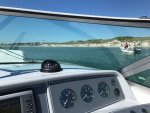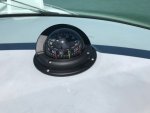- Joined
- Jul 18, 2011
- Messages
- 18,951
Last time I used my boat, I noticed that the compass was no longer filled with oil. So, I'm assuming a seal or something let go. I searched for similar threads here and there was one about 6 months ago.
I think my options are (1) to try a DIY repair and refill, or (2) just replace the compass.
I am assuming the thing leaked and discharged because of an aged seal, but I am not familiar with the details of compasses.
Just wondering if this can be a DIY fix, or should I just go new. I can get a new one here on iBoats for under $200, which is fine. There is an LED light on the original one, which may require some wire splicing if I get a new one.
Based on the recent thread, it looks like having Ritchie repair the compass rivals the cost of a new one. Just wondering if these things can be easiy repaired, or if it is rocket science. :noidea:
TIA for any insight :thumb:
I think my options are (1) to try a DIY repair and refill, or (2) just replace the compass.
I am assuming the thing leaked and discharged because of an aged seal, but I am not familiar with the details of compasses.
Just wondering if this can be a DIY fix, or should I just go new. I can get a new one here on iBoats for under $200, which is fine. There is an LED light on the original one, which may require some wire splicing if I get a new one.
Based on the recent thread, it looks like having Ritchie repair the compass rivals the cost of a new one. Just wondering if these things can be easiy repaired, or if it is rocket science. :noidea:
TIA for any insight :thumb:






















